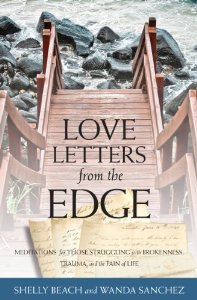 Love Letters from the Edge: Meditations for Those Struggling from Brokenness, Trauma, and the Pain of Life is FREE on Kindle today.
Love Letters from the Edge: Meditations for Those Struggling from Brokenness, Trauma, and the Pain of Life is FREE on Kindle today.
Realities Regarding PTSD and Trauma
- One in four women will experience sexual abuse in her lifetime.
- One in four women will experience domestic violence.
- An estimated 70% of adults have experienced a traumatic event at least once in their lifetime, and 20% will go on to develop post-traumatic stress disorder.
- An estimated 1 out of 10 women will develop PTSD in her lifetime. 13% of police and 15% of firefighters develop PTSD.
- 25% of women who suffer breast cancer and those who suffer heart attacks will experience PTSD.
- More than 33% of youth who witness community violence will develop PTSD.
Simply stated, trauma is any event that overwhelms the brain’s ability to cope, is perceived as a threat to one’s safety, and causes physical, emotional, or psychological distress or harm. PTSD is triggered by a terrifying event. The event becomes “stuck” in the right side of the brain when the left side shuts down in response to the trauma. The traumatic event can’t be completely processed and replays, leaving the person in the fight-flight-freeze mode, which produces trauma-related symptoms.
PTSD in the Pews
Someone you know is suffering from trauma. In an average rural or suburban church of 200, nearly twenty members (approximately 8%) will be suffering from PTSD, many in silence. Most won’t know that their symptoms are related to trauma or that treating symptoms isn’t the same as treating trauma.
It that church is an urban church of 2,000, the statistics for the occurrence of PTSD are the same for soldiers returning from Afghanistan–more than 30%. That means that over 600 people in the congregation are suffering from PTSD. What is equally significant is that studies now tell us that the effects of PTSD become passed down to our children.
No matter what many roles you may wear–mother, father, pastor, community leader, business owner, medical worker, educator, friend, mentor–you need to know about PTSD. Why? Because people you know are suffering. Many don’t understand why. And many don’t understand that hope and healing are available.
Who do you know who needs a love letter from God?
Love Letters from the Edge is recommended by The Gathering for Mental Health in the Church at Saddleback.
For more information, download our FREE ebook The Truth about Trauma at PTSDPerspectives.org.


